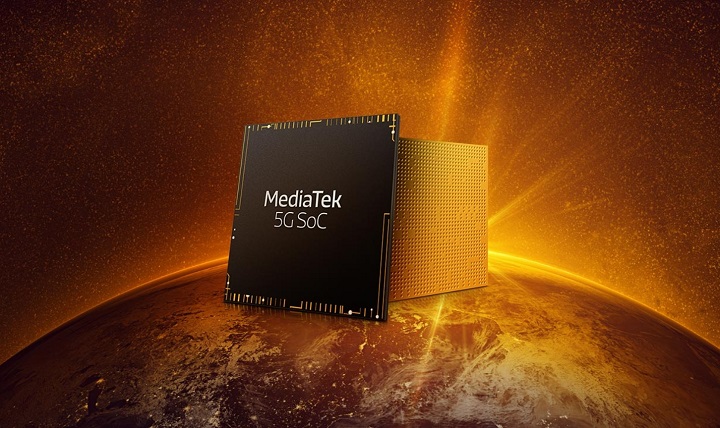MediaTek has announced its new multi-mode 5G chipset designed to be used for the first wave of 5G-enabled flagship devices.

The MediaTek 5G SoC comes with a built-in MediaTek Helio M70 5G modem. It supports LTE and 5G dual connectivity (EN-DC) with dynamic power sharing capability, plus multi-mode support for every cellular connectivity generation from 2G to 5G. It also has dynamic bandwidth switching technology that allocates 5G bandwidth required for specific applications to improve modem power efficiency by 50% and extend battery life. The chipset also includes ARM’s newest Cortex-A77 CPU, Mali-G77 GPU and MediaTek’s most advanced AI processing unit (APU) to meet the demands of the next-gen flagship devices.
MediaTek 5G SoC features:
• Helio M70 5G modem: MediaTek designed Helio M70 5G modem integrated into the SoC.
~ 4.7 Gbps download speeds and 2.5 Gbps upload speeds
~ Intelligent power savings and comprehensive power management
~ Multi-mode support – 2G, 3G, 4G, 5G – and dynamic power sharing for the best connectivity
• New AI architecture: Sports an all-new AI processing unit. Supports more advanced AI applications, including for imaging like de-blur so users get great shots even when subjects are moving fast.
• Latest CPU technology: MediaTek’s 5G SoC is a performance powerhouse with the just announced new Arm Cortex-A77 CPU.
• State-of-the-art GPU: A robust new Arm Mali-G77 GPU that enables seamless extreme streaming and gaming experiences at 5G speeds.
• Innovative 7nm FinFET: World’s first 5G SoC built on the cutting-edge 7nm production process for big energy savings in a compact package.
• Speedy throughput: A peak throughput of 4.7Gps download (sub-6GHz) and New Radio (NR) 2 Component Carrier (CC) support. Supports both non-standalone (NSA) and standalone (SA) 5G network architectures.
• Powerful Multimedia & Imaging performance: Supports 4K video encode/decode at 60fps and super high-resolution camera (80MP).
The new chipset will be ready for lead customer samples in Q3 of 2019 and be in commercial devices by Q1 of 2020.
source: MediaTek

YugaTech.com is the largest and longest-running technology site in the Philippines. Originally established in October 2002, the site was transformed into a full-fledged technology platform in 2005.
How to transfer, withdraw money from PayPal to GCash
Prices of Starlink satellite in the Philippines
Install Google GBox to Huawei smartphones
Pag-IBIG MP2 online application
How to check PhilHealth contributions online
How to find your SIM card serial number
Globe, PLDT, Converge, Sky: Unli fiber internet plans compared
10 biggest games in the Google Play Store
LTO periodic medical exam for 10-year licenses
Netflix codes to unlock hidden TV shows, movies
Apple, Asus, Cherry Mobile, Huawei, LG, Nokia, Oppo, Samsung, Sony, Vivo, Xiaomi, Lenovo, Infinix Mobile, Pocophone, Honor, iPhone, OnePlus, Tecno, Realme, HTC, Gionee, Kata, IQ00, Redmi, Razer, CloudFone, Motorola, Panasonic, TCL, Wiko
Best Android smartphones between PHP 20,000 - 25,000
Smartphones under PHP 10,000 in the Philippines
Smartphones under PHP 12K Philippines
Best smartphones for kids under PHP 7,000
Smartphones under PHP 15,000 in the Philippines
Best Android smartphones between PHP 15,000 - 20,000
Smartphones under PHP 20,000 in the Philippines
Most affordable 5G phones in the Philippines under PHP 20K
5G smartphones in the Philippines under PHP 16K
Smartphone pricelist Philippines 2024
Smartphone pricelist Philippines 2023
Smartphone pricelist Philippines 2022
Smartphone pricelist Philippines 2021
Smartphone pricelist Philippines 2020